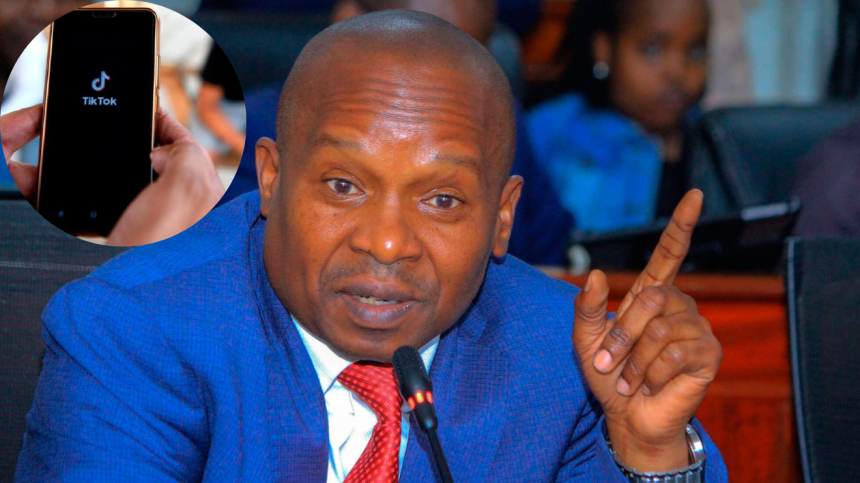The state will restrict the use of the popular Chinese social media platform TikTok by government officials to protect sensitive data and the safety of Kenyans, the Interior Ministry has said.
Interior Cabinet Secretary Kithure Kindiki told Parliament that the National Security Council (NSC) is currently looking into the threats posed by social media platforms, including TikTok.
“We are currently dealing with this issue of TikTok as the NSC. As you know, the Ministry of Interior is coordinating the cyber security programme on behalf of the country,” said Prof Kindiki.
“We as the National Police Service (NPS) and the National Intelligence Service (NIS) are working with the Ministry of Defence and the Ministry of ICT to protect our cyberspace from internal and external threats.”
Prof Kindiki told the National Assembly’s Public Petitions Committee that the NSC was toying with the idea of banning civil servants from using TikTok to protect sensitive data.
He said that while there was no policy on the use of social media platforms such as TikTok by public officials, the NSC was looking into the matter intending to restrict its use.
Kuria East MP Marwa Kitayama, who chaired the meeting, said the petition to ban TikTok raised serious cyberspace concerns and demanded to know if there was a government policy on the use of TikTok and other social media platforms by people holding critical government information.
“People who have critical government information are on TikTok. Is there a government policy on the use of social media platforms by government officials?” Mr Kitayama asked.
“China, where TikTok originated, has banned the use of TikTok. In the US, 34 out of 54 states have banned government officials from using the TikTok app on their phones. Are Kenyan government officials obliged not to have this app on their phones?”
Prof Kindiki said the outcome of the NSC deliberations will inform policy on whether or not to restrict certain aspects of TikTok for use by government officials and certain age groups in Kenya.
“This matter is so complex, so consequential that it is not easy to look in one direction and decide whether to ban TikTok or not,” Prof Kindiki said.
“The petition raises very serious issues. The issues go to the heart of the safety and security of our people. TikTok is a platform that brings huge economic benefits. But there are also serious dangers. We are actively engaging with TikTok and we will be making some decisions soon”.
He appeared before the committee to explain the government’s position on a petition to ban TikTok in the country.
The committee is hearing stakeholders’ views on a petition filed by Bob Ndolo, the managing director of Bridget Connect Consultancy, who wants Parliament to sanction the closure of TikTok’s operations on the grounds that it exposes young people to explicit sexual content.
Mr Ndolo argued that while the use of the application has gained popularity among the country’s youth, the content shared on the platform is inappropriate, promoting violence, explicit sexual content, hate speech, vulgar language and offensive behaviour that poses a serious threat to cultural and religious values.
“Honourable Members, the TikTok platform has been used by criminals to spread malicious propaganda, steal popular accounts through identity theft and impersonation, perpetrate fraud by duping Kenyans into fake foreign exchange trading and fake job postings, and distribute sexual content and images through its live feature,” Prof Kindiki told MPs.
“These risks have caused distress to users, exposed minors to inappropriate content and promoted discord among citizens.”
Prof Kindiki said the government, through the Data Protection Commissioner, had contacted TikTok and raised concerns about its processing activities.
“The government is seeking to ascertain TikTok’s level of compliance with the Data Protection Act, 2019 in order to understand what measures need to be taken to ensure that the privacy of individuals is respected in accordance with the law.
“In this regard, this office has required that TikTok demonstrate compliance with the requirements of the Act and other relevant laws and provide details on the effectiveness of age verification and content filtering, if any,” he said.
“This office has also requested that TikTok implement additional Kenya-specific supplementary provisions in its privacy policy, taking into account the provisions of the Act, and upon demonstration of compliance, register with the Office of the Data Commissioner as a data controller and/or data processor.”
Prof Kindiki said if TikTok failed to respond to the Data Commissioner, “we will enforce the law through the issuance of directives, orders and requirements”.
He said the government has done the same with World Coin, where it has continued to reject the US government’s push to allow World Coin back into Kenya to collect citizens’ iris data.



